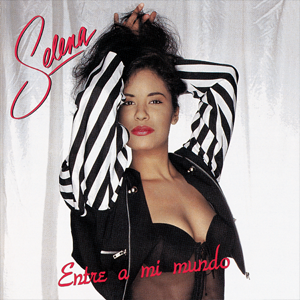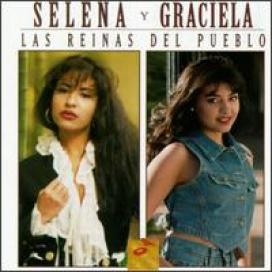
Selena Quintanilla Pérez, known professionally as Selena, was an American singer. Referred to as the "Queen of Tejano Music", her contributions to music and fashion made her one of the most celebrated Mexican-American entertainers of the late 20th century. In 2020, Billboard magazine put her in third place on their list of "Greatest Latino Artists of All Time", based on both Latin albums and Latin songs chart. Media outlets called her the "Tejano Madonna" for her clothing choices. She also ranks among the most influential Latin artists of all time and is credited for catapulting the Tejano genre into the mainstream market.

Ven Conmigo is the second studio album by American singer Selena, released on November 12, 1990, by EMI Latin. The singer's brother, A.B. Quintanilla III remained her principal record producer and songwriter after her debut album's moderate success. Selena's Los Dinos band composed and arranged seven of the album's ten tracks; local songwriter Johnny Herrera also provided songs for Selena to record. Ven Conmigo contains half cumbias and half rancheras, though the album includes other genres. Its musical compositions are varied and demonstrate an evolving maturity in Selena's basic Tejano sound. The album's structure and track organization were unconventional compared with other Tejano music albums. The songs on Ven Conmigo are mostly love songs or songs following a woman's struggles after many failed relationships.

Entre a Mi Mundo is the third studio album by American singer Selena, released on May 6, 1992, by EMI Latin. The label endeavored to bolster Selena's popularity within the Latin music market in the United States with this release. Selena's brother, A. B. Quintanilla kept his role as the singer's producer and, in collaboration with Selena y Los Dinos members Pete Astudillo and Ricky Vela, composed tracks for the album. The ensuing recording encompassed an eclectic array of songs, attributable to the members' diverse backgrounds, which facilitated the modernization of the many genres they explored. Entre a Mi Mundo is a Tejano cumbia album that encapsulated Selena's quintessential sound, characterized by engaging tunes harmonized with her distinctive, plaintive vocals and a relaxed, danceable cumbia beat. The album incorporates musical inspirations from power pop, R&B, disco, rock, funk, and synthesized Tejano music.

Selena is the self-titled debut studio album by American Tejano singer Selena, released on October 17, 1989, by EMI Latin. Its music incorporates a range of contemporary genres with a mix of cumbia and regional styles of Mexican music. The album was released following company president Jose Behar's failed crossover request for the singer. The project was denied by the heads of EMI Records' pop division, believing the singer should first strengthen her fanbase. Selena's brother and principal record producer and songwriter, A.B. Quintanilla III fought to remain the singer's producer. The band introduced Pete Astudillo and Joe Ojeda, who contributed to the album's experimental production and songwriting. Aside from A.B., Selena worked with two Mexican songwriters, Alejandro Montealegre and Reinaldo Ornelas.

Live! or Selena Live! is a live album by American Tejano pop singer Selena, which was released on May 4, 1993, by EMI Latin. The album was re-released on September 22, 2002, as being part of the Selena: 20 Years of Music collection; which included spoken liner notes by her family, friends and her former band members Selena y Los Dinos. Live! includes three cumbia-influenced studio tracks, while the rest of the album consists of live versions of previously released songs. The album was recorded during a free concert at the Memorial Coliseum in Corpus Christi, Texas, on February 7, 1993. It was certified gold by the Recording Industry Association of America in its first year, double platinum in 1995, and 8× platinum in 2017.

Alpha is the second independent studio album by American Tejano music group Selena y Los Dinos. Released in 1986 under Manny Guerra's G.P. Productions, it followed the group’s debut album, which was recorded under Freddie Records. Selena y Los Dinos, led by vocalist Selena, recorded mostly cover songs. Wanting to stand out, bassist A.B. Quintanilla requested original material from Luis Silva after noticing his track record for writing award-winning songs. Silva ignored A.B.'s request and he was inspired by Abraham to write songs himself. The group expanded to include keyboardist Ricky Vela and guitarist Roger Garcia. Vela collaborated with A.B. on "Dame un Beso", while he collaborated with Abraham on "Dame tu Amor". A.B. became Selena y Los Dinos' music producer and songwriter, while Abraham encouraged them to record songs of various genres to appeal to a wider audience. Despite her limited Spanish, Selena recorded all nine tracks phonetically.

American singer Selena released eleven studio albums, three live albums, three boxsets, three remix albums, two soundtrack albums, and twenty compilation albums. Credited for elevating a music genre into the mainstream market, Selena remains the best-selling Tejano recording artist in history, selling over 18 million records worldwide. She was named the top-selling Latin artist of the 1990s decade in the US by Billboard magazine.

Mis Mejores Canciones – 17 Super Éxitos is a greatest hits album by American singer Selena released on September 17, 1993, through EMI Latin. Beginning in January 1993, the label released a comprehensive collection that spotlighted its Latin music artists as part of its Latin Classics series. Mis Mejores Canciones – 17 Super Exitos encompasses 17 tracks, ranging from songs recorded on her debut album with EMI Latin, to songs present in Entre a Mi Mundo (1992). The album received a positive response from music critics who enjoyed the label's catalog releases and praised the tracks on the album for showcasing Selena's early popular recordings. Following the shooting death of Selena on March 31, 1995, Mis Mejores Canciones – 17 Super Exitos debuted at number one on the US Billboard Top Catalog Albums chart, the first Spanish-language recording to do so. The Recording Industry Association of America (RIAA) certified the album diamond (Latin), denoting 600,000 units shipped in the United States.

Anthology is the first box set by American singer Selena. It was released posthumously on April 7, 1998, through EMI Latin to commemorate the singer's works. The collection comprises 30 tracks, dispersed across three genre-themed discs: "Pop / English" showcases uptempo pop compositions, "Mariachi" highlights Mexican ballads featuring poignant narratives of heartache, and "Cumbia" presents danceable tropical rhythms. The album encompasses recordings from a 14-year-old Selena on her Alpha (1986) album to the posthumous "Disco Medley" (1997). With a limited number of unaltered tracks, Anthology predominantly features reworked and remastered musical arrangements, while preserving the singer's original vocals. Selena's death in March 1995 prompted an influx of requests from her admirers. The singer's father and manager, Abraham Quintanilla, expressed a desire to maintain his daughter's legacy through her music. However, Selena's family has faced criticism from both fans and the media, who accuse them of capitalizing on her death and commodifying her repertoire.

All My Hits: Todos Mis Éxitos is a greatest hits album by American singer Selena. It was released posthumously on March 9, 1999, through EMI Latin to commemorate its ten-year anniversary since entering the music industry. The album coincided with the fourth anniversary of Selena's death, though then-president Jose Behar rebuffed the idea that the album was an exploitive ploy by the company. Following Selena's death on March 31, 1995, Abraham Quintanilla expressed his interest in preserving his daughter's memory through her works. Selena's family has been criticized by fans and the media for exploiting the singer and cannibalizing her murder by commercializing her repertoire. According to the singer's brother, A.B. Quintanilla, one of Selena's wishes was for her to "never go away", citing a conversation he shared with Selena and their sister Suzette Quintanilla, that if anything were to happen to any one of them, their wish would be to continue on with their music.

All My Hits: Todos Mis Éxitos Vol. 2 is a greatest hits album by American singer Selena that was released on February 29, 2000, through EMI Latin. After Selena's murder in 1995, her father Abraham Quintanilla stated his commitment to preserving her music and EMI Latin pledged ongoing support for her releases. In 1999, the label's president José Behar acknowledged Selena, who remained the label's top-selling artist, for her contributions to establishing EMI Latin as "the house that Selena built". In March 1999, to commemorate the label's tenth anniversary, it released All My Hits: Todos Mis Éxitos; it achieved commercial success and a sequel was announced. All My Hits: Todos Mis Éxitos Vol. 2 contains 16 songs ranging from tracks featured on Selena's Muñequito de Trapo (1987) to the posthumous 1997 club remix of "Enamorada de Ti" (1990).

"Techno Cumbia" is a song recorded by American singer Selena for her fourth studio album, Amor Prohibido (1994). It was posthumously released as the b-side track to "Dreaming of You" through EMI Latin on August 14, 1995. Techno Cumbia would be put on her fifth and final studio album Dreaming of You (1995) and would be the fourth single for Dreaming Of You. "Techno Cumbia" was written by Pete Astudillo and co-written and produced by Selena's brother-producer A.B. Quintanilla. The song is a dance-pop and tecnocumbia recording with influences of dancehall, rap, Latin dance, and club music. Lyrically, Selena calls on people to dance her new style the "techno cumbia" and calls out those who cannot dance.

Las Reinas del Pueblo is a compilation album by American Tejano music singer Selena and Mexican banda singer Graciela Beltrán. Posthumously released on April 4, 1995, by EMI Latin in the wake of Selena's death on March 31, 1995, the decision to produce a compilation album featuring Beltrán emerged after her tribute to the singer at a Houston memorial. The title was inspired by Mexican newspapers that referred to Selena as "an artist of the people" during a 1992 press tour in the nation and subsequently dubbed her "La Reina del Pueblo" in the aftermath of her death. Las Reinas del Pueblo encompasses six tracks by Selena and six by Beltrán, encapsulating their respective tenures with EMI Latin. Las Reinas del Pueblo peaked at number four on the US Billboard Top Latin Albums and Regional Mexican Albums chart, both behind other Selena releases. The recording peaked at number 147 on the American Billboard 200 chart. The album peaked at number ten on the Spanish albums chart in 2010. Beltrán's participation in the album yielded substantial promotional and sales enhancements.

"Buenos Amigos" is a down-tempo, pop ballad duet recorded by Salvadoran recording artist Álvaro Torres and American recording artist Selena for Torres' sixth studio album Nada Se Compara Contigo (1991). The song was released by EMI Latin in 1992, as the album's second single. Its lyrics explore a friendship built on the strong, unrequited feelings of the male narrator. Torres composed "Buenos Amigos" after attending a showcase event at which Selena was performing.

Dulce Amor is the sixth and last independent studio album by Tejano music group Selena y Los Dinos. The album became the final album to be released from RP Records on December 24, 1988. Selena's brother, A.B. Quintanilla III had become the main songwriter. Selena recorded fourteen songs but only released ten. All the songs were recorded in three different recording studios. Dulce Amor helped Selena to be noticed at the 1989 Tejano Music Awards. She was then signed by EMI Latin. This would be the last studio album to be released under “Selena y Los Dinos” as all subsequent albums would be released under “Selena”. The album had only sold over 30,000 copies. It was ordered to be removed from stores by EMI Records.

And the Winner Is... is the fourth independent studio album by Tejano music group Selena y Los Dinos. It was released in April 1987 under Manny Guerra's GP Productions. The title alludes to the multitude of accolades Selena garnered since her entry into the music industry. And the Winner Is... was unveiled with the objective of expanding the Tejano audience that the band had recently enthralled. Among the album's singles, "La Bamba" represented Selena's initial appearance on a national music chart, reaching its peak at number 20 on the US Billboard Hot Latin Tracks chart in August 1987. Concurrently, Selena's rendition was released around the same time as Los Lobos', which supported the eponymous film. As Selena y Los Dinos was a relatively obscure group, their version began to wane on the chart as Los Lobos' version climbed. And the Winner Is... garnered favorable reception from music critics, with Tim Baker of Newsweek observing the group's gradual elimination of their characteristic doo-wop sound from prior recordings. While And the Winner Is... secured a nomination for Album of the Year at the 1988 Tejano Music Awards, Selena won Female Vocalist of the Year, her second consecutive win.

Preciosa is the fifth independent studio album by Tejano music group Selena y Los Dinos. It was released on October 10, 1988 under Manny Guerra’s RP Records. Preciosa garnered favorable reception from music critics, with Tim Baker of Newsweek observing the group finally purging their oldie influences from their discography. At the 1989 Tejano music awards, Selena was the finalist for Female Vocalist of the Year. Terco Corazon was nominated for Single of the Year, and A.B was nominated for Songwriter of the Year.

Selena y Los Dinos is the debut independent studio album by American Tejano music group Selena y Los Dinos. It was released on July 16, 1984 under Freddie Martinez’s Freddie Records. The album was originally released in cassette format and in limited quantities. The album was not sold in stores and Freddie Records did little to promote it. In 1995, the album was re-issued under the title Mis Primeras Grabaciones and again in 2005, during the 10th anniversary of Selena's passing, with remastered audio tracks.

















